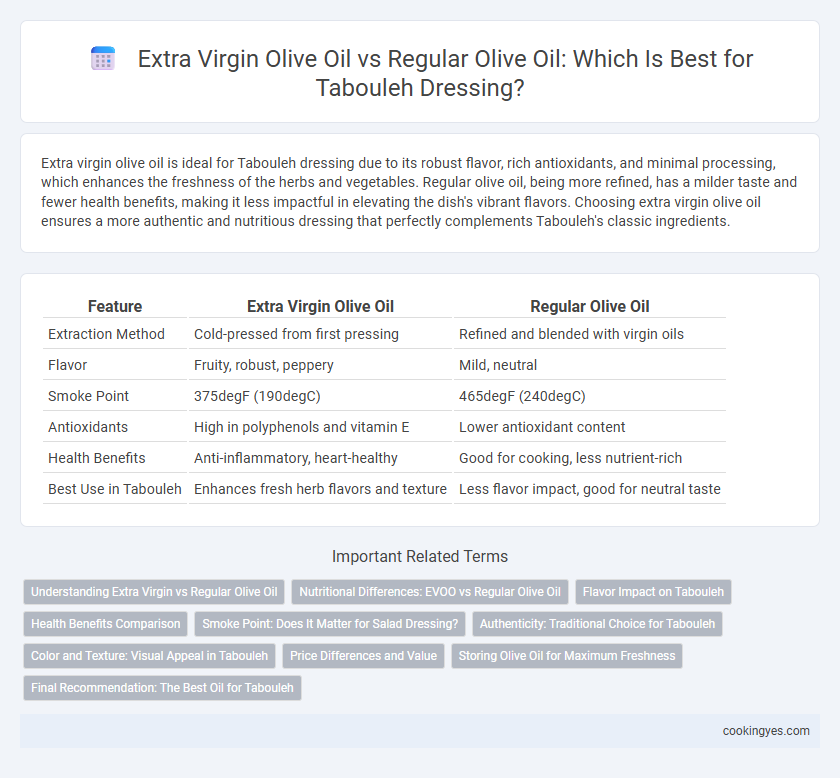Extra virgin olive oil is ideal for Tabouleh dressing due to its robust flavor, rich antioxidants, and minimal processing, which enhances the freshness of the herbs and vegetables. Regular olive oil, being more refined, has a milder taste and fewer health benefits, making it less impactful in elevating the dish's vibrant flavors. Choosing extra virgin olive oil ensures a more authentic and nutritious dressing that perfectly complements Tabouleh's classic ingredients.
Table of Comparison
| Feature | Extra Virgin Olive Oil | Regular Olive Oil |
|---|---|---|
| Extraction Method | Cold-pressed from first pressing | Refined and blended with virgin oils |
| Flavor | Fruity, robust, peppery | Mild, neutral |
| Smoke Point | 375degF (190degC) | 465degF (240degC) |
| Antioxidants | High in polyphenols and vitamin E | Lower antioxidant content |
| Health Benefits | Anti-inflammatory, heart-healthy | Good for cooking, less nutrient-rich |
| Best Use in Tabouleh | Enhances fresh herb flavors and texture | Less flavor impact, good for neutral taste |
Understanding Extra Virgin vs Regular Olive Oil
Extra virgin olive oil, derived from the first cold pressing of olives, offers a richer flavor profile and higher antioxidant content compared to regular olive oil, which is often a blend of refined and virgin oils. In tabouleh dressing, using extra virgin olive oil enhances the dish's freshness with its robust, fruity notes while providing health benefits such as anti-inflammatory compounds and polyphenols. Regular olive oil's milder taste and higher smoke point make it less ideal for raw salads like tabouleh, where the olive oil's flavor is a key ingredient.
Nutritional Differences: EVOO vs Regular Olive Oil
Extra Virgin Olive Oil (EVOO) contains higher levels of antioxidants and polyphenols compared to regular olive oil, enhancing its nutritional value in Tabouleh dressings. EVOO's rich monounsaturated fats contribute to heart health by reducing inflammation and oxidative stress, whereas regular olive oil undergoes refining processes that degrade these beneficial compounds. Choosing EVOO for Tabouleh not only improves flavor but also boosts the immune-boosting and anti-inflammatory properties of the salad.
Flavor Impact on Tabouleh
Extra virgin olive oil enhances tabouleh with its robust, fruity flavor and peppery finish, elevating the freshness of parsley and tanginess of lemon juice. Regular olive oil, having a milder and less complex taste, results in a subtler dressing that may not bring out the vibrant herbaceous notes characteristic of traditional tabouleh. Choosing extra virgin olive oil significantly impacts the overall flavor profile, making the dish more aromatic and authentic.
Health Benefits Comparison
Extra virgin olive oil contains higher levels of antioxidants and polyphenols compared to regular olive oil, offering superior anti-inflammatory and heart health benefits. Its lower acidity and minimal processing preserve essential nutrients that promote improved cholesterol levels and reduced risk of chronic diseases. Using extra virgin olive oil in tabouleh dressing enhances both the flavor and the nutritional profile of the dish.
Smoke Point: Does It Matter for Salad Dressing?
Extra virgin olive oil has a lower smoke point around 375degF (190degC) compared to regular olive oil, which typically smokes at about 465degF (240degC), but this difference is negligible for cold dishes like tabouleh. Since tabouleh dressing involves no heating, the smoke point does not affect flavor or nutritional quality. Using extra virgin olive oil enhances the salad's taste and antioxidant profile without any risk of oxidation from heat.
Authenticity: Traditional Choice for Tabouleh
Extra virgin olive oil is the authentic choice for dressing tabouleh, prized for its rich flavor and high antioxidant content that enhances the dish's freshness. Unlike regular olive oil, which undergoes more processing, extra virgin olive oil retains natural polyphenols crucial for the traditional Mediterranean diet. Using extra virgin olive oil preserves the genuine taste and health benefits that characterize classic tabouleh recipes.
Color and Texture: Visual Appeal in Tabouleh
Extra virgin olive oil enhances Tabouleh's color with its rich, golden-green hue, creating a vibrant visual appeal that contrasts beautifully with the bright parsley and ripe tomatoes. Its thicker, more viscous texture adds a silkier mouthfeel, coating ingredients evenly without overpowering the dish. Regular olive oil, typically lighter in color and thinner in consistency, results in a less vivid presentation and a more watery dressing that may diminish the overall sensory experience.
Price Differences and Value
Extra virgin olive oil generally costs significantly more than regular olive oil due to its superior extraction process and higher quality, making it a premium choice for tabouleh dressing. While the price difference may be notable, extra virgin olive oil offers enhanced flavor complexity and health benefits, providing better value in terms of taste and nutritional content. For authentic tabouleh, investing in extra virgin olive oil optimizes the dish's freshness and richness, justifying the higher cost compared to regular olive oil.
Storing Olive Oil for Maximum Freshness
Extra virgin olive oil is preferred for Tabouleh dressing due to its superior flavor and higher antioxidant content compared to regular olive oil. To maximize freshness, store olive oil in a cool, dark place away from heat sources and sunlight, ideally in a tightly sealed dark glass bottle. Proper storage prevents oxidation and preserves the oil's rich taste and nutritional benefits essential for an authentic Tabouleh experience.
Final Recommendation: The Best Oil for Tabouleh
Extra virgin olive oil is the best choice for tabouleh dressing due to its robust flavor and higher antioxidant content, which enhances the freshness of the parsley and lemon juice. Regular olive oil, being more processed, lacks the rich, fruity notes essential for authentic tabouleh taste. Using cold-pressed, high-quality extra virgin olive oil ensures an optimal balance and elevates the traditional dish's overall flavor profile.
Extra Virgin Olive Oil vs Regular Olive Oil for Dressing Infographic

 cookingyes.com
cookingyes.com